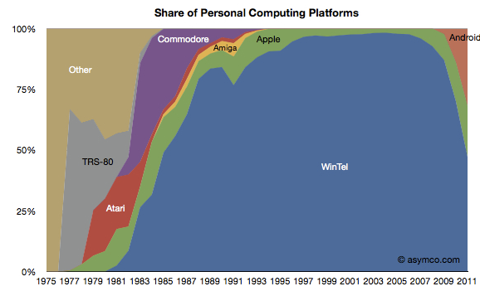November 25, 2012
By Jon Evans

Long have I hated Microsoft (MSFT). For decades their bloated mediocrity infuriated every fiber of my being. Like Adam Sandler and leaf-blowers, for a very long time, they represented everything that was wrong with today's world. But just as Adam Sandler went and made Punch Drunk Love, over the last few years, Microsoft has released a body of work that even I must grudgingly admit is interesting, innovative, and sometimes downright visionary.
Take Kinect. It began life as "merely" a cool game interface, but it's steadily becoming Quite A Big Deal. It's being used for 3D modelling, within web browsers, and in a whole panoply of third-party applications.
And that's just one of the genuinely fascinating innovations - including bioprogramming, a universal translator, and virtual reality - bubbling up from what our own Natasha Lomas called Microsoft's "cauldron of ideas," Microsoft Research.
Not long ago Microsoft security was a joke; it seemed like every non-techie I knew had had their Wintel machine hacked or compromised, and you hardly dared to type a password in an Internet cafe. Now, though, not a single Microsoft project features among Kaspersky's Top 10 list of vulnerabilities.
The Surface is getting, at best, mixed reviews (of note, MG is downright contemptuous, while Jeff Atwood really likes it), but even its staunchest critics have to admit that Microsoft's tablet/laptop crossover is, at least, somewhat interesting and innovative - if ultimately unsuccessful.
This raises a larger point: Microsoft is now further along than Apple (AAPL) and Google (GOOG) at integrating their mobile and desktop OSes. Windows 8 is a giant step ahead on that journey, while the other two are still stuck with their iOS/OS X and Android/Chrome OS bifurcations. (Though I expect both forks to merge in the next couple of years.) And whatever you think of Windows 8′s "Metro" interface, you have to admit, at least it's new and not boring.
What happened to the staid, colorless, bland, third-rate Microsoft that we used to know? Why is even the mighty Woz worried that Microsoft has become more innovative than Apple? Well, here's the answer for you in a single graph, courtesy of Horace Dediu of Asymco:
(click to enlarge)
The graph clearly shows that the Wintel monopoly that dominated personal computing for so long is now well and truly dead. (And this graph is almost a year old.) Microsoft has to innovate now. It's that or die.
Trouble is, even if they do innovate, that doesn't mean that Microsoft will live, because "new" and "interesting" are completely orthogonal to "successful." Out of everything I mentioned above, only the Kinect is a hit. Of course they're not in any immediate danger - they're still a massively profitable behemoth - but as Paul Graham points out, revenue is a lagging indicator in the tech world.
Are we witnessing Microsoft's long-awaited phoenix-like reinvention or the first stirrings of its death spasms? I don't know, but either way, I'm pretty sure it's going to be interesting to watch.

Long have I hated Microsoft (MSFT). For decades their bloated mediocrity infuriated every fiber of my being. Like Adam Sandler and leaf-blowers, for a very long time, they represented everything that was wrong with today's world. But just as Adam Sandler went and made Punch Drunk Love, over the last few years, Microsoft has released a body of work that even I must grudgingly admit is interesting, innovative, and sometimes downright visionary.
Take Kinect. It began life as "merely" a cool game interface, but it's steadily becoming Quite A Big Deal. It's being used for 3D modelling, within web browsers, and in a whole panoply of third-party applications.
And that's just one of the genuinely fascinating innovations - including bioprogramming, a universal translator, and virtual reality - bubbling up from what our own Natasha Lomas called Microsoft's "cauldron of ideas," Microsoft Research.
Not long ago Microsoft security was a joke; it seemed like every non-techie I knew had had their Wintel machine hacked or compromised, and you hardly dared to type a password in an Internet cafe. Now, though, not a single Microsoft project features among Kaspersky's Top 10 list of vulnerabilities.
The Surface is getting, at best, mixed reviews (of note, MG is downright contemptuous, while Jeff Atwood really likes it), but even its staunchest critics have to admit that Microsoft's tablet/laptop crossover is, at least, somewhat interesting and innovative - if ultimately unsuccessful.
This raises a larger point: Microsoft is now further along than Apple (AAPL) and Google (GOOG) at integrating their mobile and desktop OSes. Windows 8 is a giant step ahead on that journey, while the other two are still stuck with their iOS/OS X and Android/Chrome OS bifurcations. (Though I expect both forks to merge in the next couple of years.) And whatever you think of Windows 8′s "Metro" interface, you have to admit, at least it's new and not boring.
What happened to the staid, colorless, bland, third-rate Microsoft that we used to know? Why is even the mighty Woz worried that Microsoft has become more innovative than Apple? Well, here's the answer for you in a single graph, courtesy of Horace Dediu of Asymco:
(click to enlarge)

The graph clearly shows that the Wintel monopoly that dominated personal computing for so long is now well and truly dead. (And this graph is almost a year old.) Microsoft has to innovate now. It's that or die.
Trouble is, even if they do innovate, that doesn't mean that Microsoft will live, because "new" and "interesting" are completely orthogonal to "successful." Out of everything I mentioned above, only the Kinect is a hit. Of course they're not in any immediate danger - they're still a massively profitable behemoth - but as Paul Graham points out, revenue is a lagging indicator in the tech world.
Are we witnessing Microsoft's long-awaited phoenix-like reinvention or the first stirrings of its death spasms? I don't know, but either way, I'm pretty sure it's going to be interesting to watch.

No comments:
Post a Comment